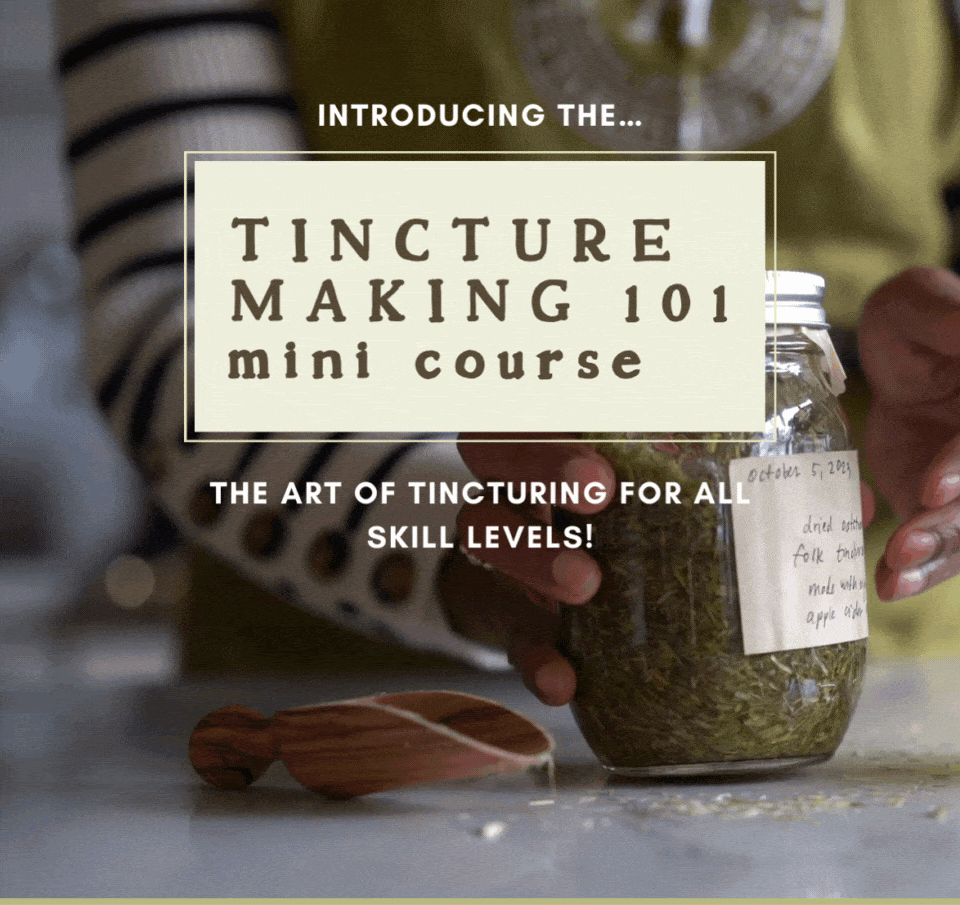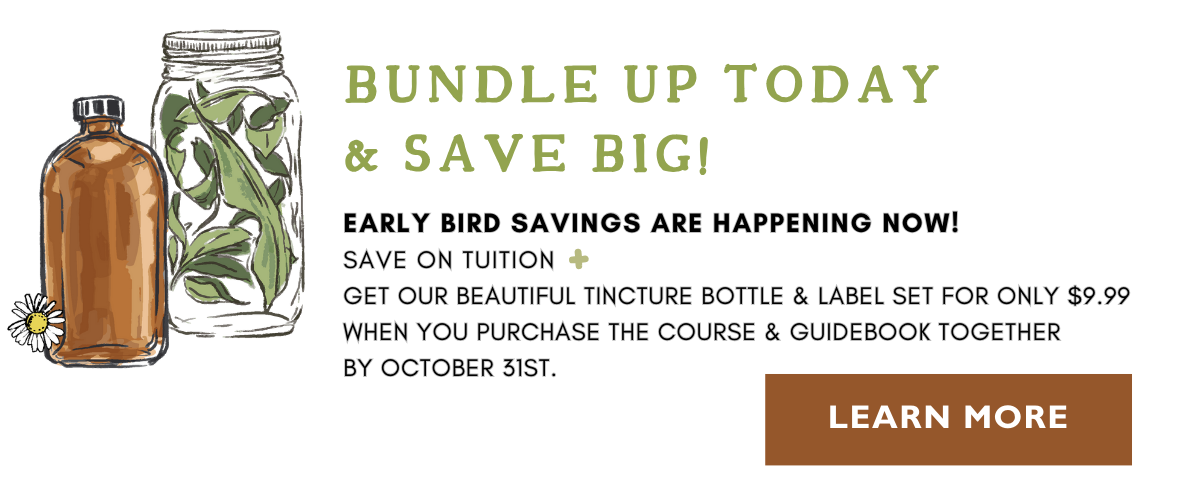Step-by-Step Tincture Making Guide
Master the Art of Creating Powerful Herbal Remedies with Herbal Academy's Comprehensive Mini Course
Introduction
Welcome to your initiation into the ancient practice of tincture making. As more people turn to natural remedies for their health needs, the art of creating potent herbal tinctures has experienced a surge in popularity. But where do you start on this journey of herbal discovery?
That's where Herbal Academy steps in. Our comprehensive mini course is designed to guide you through the process, from selecting the right herbs and equipment, to mastering the extraction process, and creating your own powerful remedies.
There are a host of benefits to be reaped from making your own tinctures at home. Not only is it cost-effective, but it also allows for a high degree of customization. By the end of this guide, you'll have the knowledge and confidence to create tinctures tailored to your own wellness journey.
Let's dive in and start to unlock the healing power of plants with our step-by-step tincture making guide.
Understanding Tinctures and Ingredients
Herbal tinctures, concentrated liquid extracts of herbs, have been a cornerstone in traditional herbal medicine for millennia. They are created by soaking parts of an herb such as the bark, berries, leaves, or roots in a solvent like alcohol or vinegar, extracting their active components into a potent liquid form. The strength and effectiveness of a tincture largely rely on the quality of herbs used, emphasizing the importance of selecting high-quality, organic herbs for your mix.
There are different types of tinctures, namely alcohol, alcohol-free, folk, and vinegar tinctures. The choice of tincture type depends on the extraction method and the solvent used. Alcohol tinctures, the most common type, use alcohol as a solvent to extract the herbal properties. Alcohol-free tinctures, on the other hand, use glycerine or vinegar as a solvent, making them a suitable alternative for those who wish to avoid alcohol.
Choosing the right solvent is crucial as it impacts the extraction of the active components from the herbs. While alcohol is often preferred due to its ability to extract a wide range of plant compounds, vinegar and glycerine can also be used, especially for making alcohol-free tinctures. Always remember to choose a solvent that suits your needs and preferences.
Before starting your tincture-making journey, it's important to consult with a healthcare professional, especially if you're currently on medication. Since the United States Food and Drug Administration (FDA) does not regulate the creation or use of herbal tinctures, professional advice is key to ensure safe and effective use.
With the right knowledge and quality ingredients, you can tap into the power of plants and create your own potent herbal tinctures right at home.
Sources:
- https://www.medicalnewstoday.com/articles/324149
- https://www.healthline.com/health/what-is-a-tincture
- https://blog.mountainroseherbs.com/guide-tinctures-extracts
Equipment and Preparation
Embarking on the journey of creating your own herbal tinctures? Equip yourself with the right tools to ensure a seamless process. Here's what you need:
- Stainless steel wine press: This tool, which you can find online stores, is perfect for pressing out herbal tinctures and collecting higher volumes of your herbal remedy.
- Nylon straining bag: Essential for straining your medicinal herbs, these bags are durable and reusable.
When it comes to storage, The Herbal Academy recommends canning jars and Boston Round Bottles. Remember to store your dried herbs in a dark cupboard to protect them from light exposure.
Preparation of Herbs
Whether you're using fresh or dried herbs, proper ratios are key. The timing of the extraction process also significantly impacts the quality of your tincture. Stay tuned for more on this topic.
Sources:
- https://nikkihawkes.com/equipment-for-making-herbal-medicine/
- https://theherbalacademy.com/5-storage-containers-every-herbalist-should-have-on-hand/
Tincture Making Process
Making a tincture may seem like a complex process, but with the right guidance, it's as easy as pie. Let's dive into the step-by-step guide of creating tinctures using the mathematical ratio method, an efficient and effective way to harness the power of herbs.
Step 1: Material Preparation
Start by choosing your herbs. The proportion plays a crucial role here, too little or too much can affect the potency of your tincture. For fresh leaves and flowers, fill the jar 2/3 to 3/4 with finely chopped or ground herbs. If you are using dried leaves and flowers, fill the jar 1/2 to 3/4 with finely cut herbs. (source)
Step 2: Alcohol Addition
Next, pour alcohol to the very top of the jar, ensuring that your herbs are completely covered. The jar should appear full of herbs, but they should move freely when shaken.
Step 3: Labeling
Don't rely solely on your memory! Properly label your tincture to avoid any confusion later on. Include details like the name of the herb, the date of preparation, and the alcohol used. (source)
Step 4: Final Touches
Finally, transfer your tincture into amber glass dropper bottles using a metal funnel and cheesecloth to filter out the herbal material. Store in a cool, dark place.
With the knowledge gained from the Herbal Academy's Comprehensive Mini Course, you can create custom formulas to suit your needs. Happy tincturing!
Sources:
- https://www.frontiercoop.com/community/articles/how-to-make-herbal-tinctures
- https://blog.mountainroseherbs.com/guide-tinctures-extracts
Storage, Dosage, and Troubleshooting
Once your tincture is prepared, proper storage is vital. Keeping it in a cool, dark place extends its shelf life. The use of amber glass bottles protects the contents by blocking harmful light rays. Stick to the rule of thumb - a tincture can last up to 5 years if stored correctly.
As for dosage, it's a personalized consideration. Generally, a range of 15-30 drops, 1-3 times daily is the usual recommended dosage. However, always keep personalized health insights in mind and adjust accordingly.
- Troubleshooting forms a crucial part of this guidebook. It's common to face issues like mold growth or weak tinctures. To counter mold, ensure your herbs are completely submerged in alcohol. As for weak tinctures, they often result from a low herb-to-alcohol ratio. Adjusting these parameters can often rectify the issues.
- For those opting for non-alcoholic tinctures, vinegar and glycerites make excellent alternatives. They offer their own benefits and unique tastes.
Remember, perfection comes with practice and patience. When in doubt, refer back to your tincture making guidebook or consult with Sharvanthika eHealth Services for a personalized touch.
Benefits of Tincture Making
Creating your own herbal tinctures offers an array of benefits that make it worth exploring. One of the primary advantages is cost-effectiveness. By making your tinctures at home, you save money and get more control over the quality of ingredients used. You can source your herbs, choose your solvent, and make as much or as little as you need.
Another benefit is the customization aspect. You're not limited to the tinctures available in stores or online. You can mix and match your herbs based on your health needs or personal preferences, essentially crafting a personalized wellness journey.
Additionally, creating your own tinctures equips you with new knowledge and confidence. You learn about different herbs, their benefits, and how to extract their healing properties. This can be empowering, leading to a more holistic approach to health and wellness.
In conclusion, tincture making is a skill that offers numerous benefits, from saving money to personalized health solutions. It's a journey worth embarking on if you're interested in herbal medicine and self-care.
Sources:
- https://www.healthline.com/health/what-is-a-tincture
- https://www.zenmaitri.com/blogs/news/what-are-herbal-tinctures
- https://firstcurveapothecary.com/blogs/herbal-insights/the-benefits-of-tinctures-and-how-we-take-ours
Conclusion
In wrapping up, we've journeyed through the fascinating process of herbal tincture making. From understanding what a tincture is to learning the folk method of production, we've gained a wealth of knowledge from this mini course.
Remember, the art of herbal tincture making is a blend of science and tradition. It's a skill that, once mastered, can empower you to harness the healing power of plants and contribute to natural wellness.
For a limited time, there are special offers and discounts available for enrolling in this enlightening mini course. I encourage you to seize this opportunity and immerse yourself in the ancient art of tincture making. The plants are waiting to share their secrets with you!Sources:


